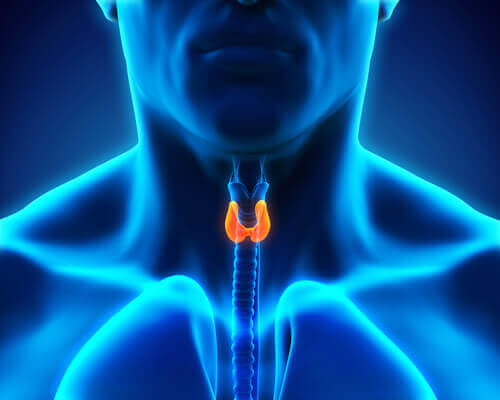A subtle increase or slight decrease in thyroid hormones can completely change people’s behavior, their preferences, sexual behavior, appetite or attitudes are affected, so the relationship between the thyroid and the emotional state is very close.
The butterfly-shaped thyroid gland is one of the most important in the human body, so if we start having problems related to that, physical and emotional disorders are more likely to occur. Do you want to know the relationship between the thyroid and the emotional state?
- The thyroid is the gland responsible for regulating metabolism and providing our body with the amount of energy needed to perform its basic functions.
- That is.
- It is he who sets the rate of calorie combustion in our cells and the rhythm of our heartbeats.
It is located in the anterior part of the neck, just below the larynx, and secretes three types of hormones: on the one hand, calcitonin, which regulates calcium levels in the blood; It is used to treat diseases such as osteoporosis, since it promotes the deposit of this mineral in the bones.
On the other hand, thyroxine (T4) and triyodothyronine (T3), which accelerate cellular metabolism, producing an increase in body heat. T4 is the main form of thyroid hormone in the blood. T3 influences the growth and development of the nervous system and heart rate.
The two most common thyroid problems are
Although both are the product of a change in the normal functioning of this gland, the two conditions have a very different impact on people with these disorders, both physically and psychologically.
At the same time, depending on whether we are talking about a particular change, the physical signs we will have will be different, in many cases they will even be opposed, on the other hand, the two agree on the fact that they are the product of inadequate stimulation of various organs of the human body.
As we have already said, the relationship between the thyroid and the emotional state is very close, the changes in hormone levels directly affect not only the physical, but also the cognitive and emotional, so the psychological symptoms and changes in the emotional state they produce are just as important.
In fact, psychological disorders are the main reason patients with hypothyroidism make an appointment, complaints include the gradual loss of initiative and interest in the widespread slowing of mental processes.
This causes memory problems, intellectual disorders, attention and concentration issues (mainly in computational tasks) and a thought that people define as confusing. The thyroid is very sensitive to psychological stimuli. As a result, patients with low activity have an emotional state close to sadness, nostalgia, melancholy and even depression.
In the most severe cases and not having received adequate treatment, the disorder can lead to dementia; Hyperthyroidism often causes irritability, nervousness, hyperactivity, impatience and sudden mood swings; it is associated with increased anxiety, mental agitation, emotional lability (people often cry, unable to control the the other) and insomnia. The fact is that if these symptoms are not treated, delusions and hallucinations can occur, as well as very serious heart, sound, muscle and reproductive problems.
Some of the most thyroid-related emotions are anger, anger or irritation, while hyperthyroidism and hypothyroidism have one thing in common: creating clearly depressive symptoms.
You should take special care with this, as it is common to confuse depression with a thyroid gland problem, i. e. while there are early signs of depression, it does not mean that there is per se.
In the case of hypothyroidism, the clinical picture of depression is most evident, which occurs by decreasing hormone production and reducing the body’s metabolism, which also decreases levels of Serotonin, Norepinephrine and Gamma-Aminobutyric Acid (GABA) in the brain.
Therefore, it is found that oscillations and changes in thyroid function can go hand in hand with serious psychological disorders, the problem is that these disorders can have an unstable origin, so before starting treatment for depression it is necessary to ensure the influence of the thyroid.
It is difficult to change thyroid hormone levels and not notice great physical and emotional instability, so what usually happens is that, thanks to the treatment of thyroid dysfunction, some psychological or psychiatric disorders improve and even disappear. Emotional status is an increasingly obvious reality, hence the importance of prevention and early diagnosis for successful problem resolution.
There are many signs and symptoms that tell us that something in our body is not working well, radical changes in fatigue levels, marked irritability or irascibility or sleep disturbances are some, so in case of suspicion it is ideal to consult a specialist. that with a simple blood test you can find out how your thyroid works.

